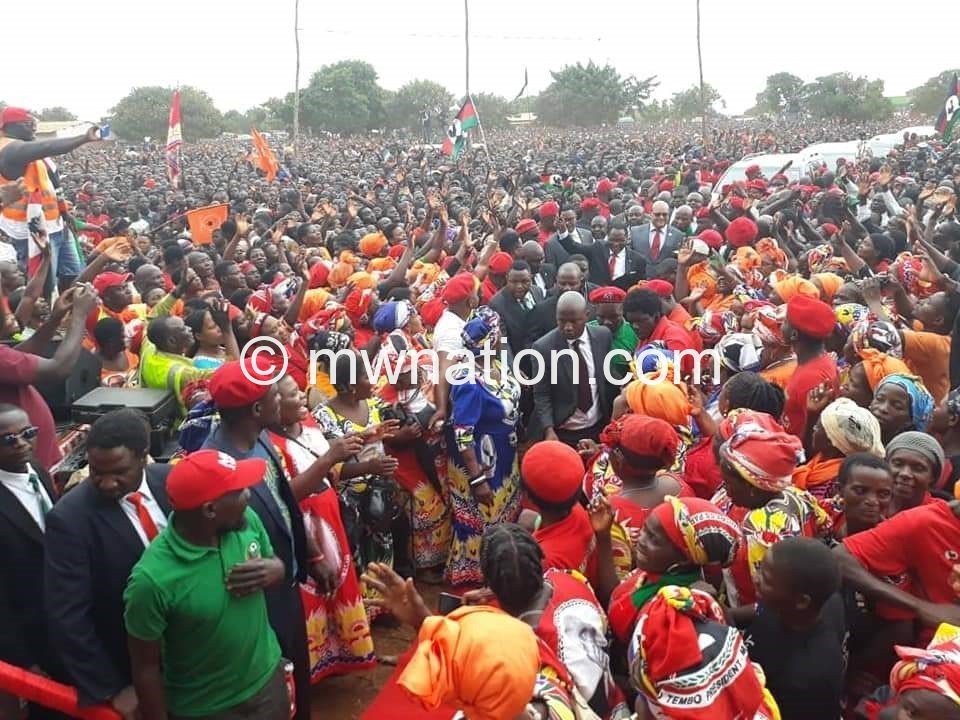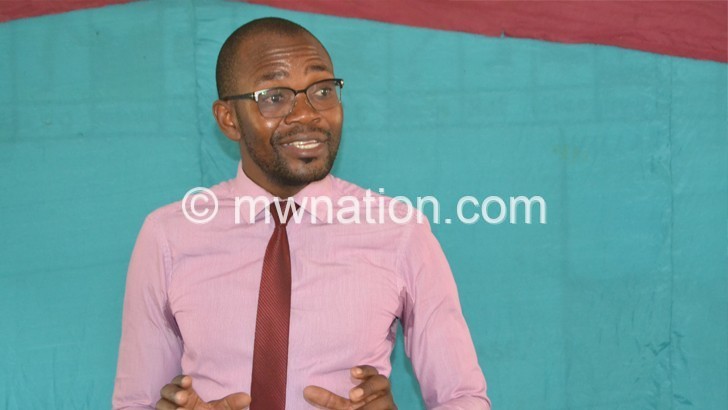MCP on profile building
As if following the saying ‘an early bird catches the worm’, MCP, one of the nine Tonse Alliance members, has wasted little time to start mending fences in districts the alliance got least votes in the June 23 court-sanctioned presidential election, but without its partners.
The engagement with chiefs also throws more light on what is in the Tonse Alliance agreement—so far a top secret between the members themselves—that they will work together on government business but go separate ways on party activities.

Malawi Congress Party national campaign director Moses Kunkuyu, who led the delegation justified the meetings with chiefs in Phalombe and Thyolo in a programme that will also take the party to all districts in the South and Eastern regions—both of which are opposition DPP and UDF strongholds, respectively.
In an interview on Tuesday, Kunkuyu said the the meetings are aimed at clearing misconceptions peddled during the recent campaign period, that the Tonse leadership would discriminate against opposition stronghold areas in the two regions on development projects.
Said Kunkuyu: “The message to the chiefs was that the Lazarus Chakwera and Saulos Chilima presidency is for everyone in the country; it won’t discriminate against anyone on the basis of tribe, religion or culture.”
In the just-ended election, the DPP-UDF alliance candidate, former president Peter Mutharika swept all the districts in the Southern and Eastern regions, amassing over 1.5 million votes against Tonse Alliance’s torch-bearer, and eventual winner of the polls Chakwera, who got 300 000 votes from the two regions.

But according to Kunkuyu, the partners in Tonse Alliance resolved to remain separate on party business, saying that is the reason the various parties are now strengthening their structures in the villages.
“On government business, we will be working together, but on political party business, sometimes political parties will be doing things individually,” explained Kunkuyu.
He said MCP invited other alliance partners to the meetings which were purely party business but the other partners did not join them.
“On their part, the chiefs thanked the MCP members for the initiative and pledged to support the leadership of Chakwera and the new government,” said Kunkuyu.
Three Tonse Alliance partners we spoke to—UTM, People’s Party (PP) and Umodzi Party (UP)—agreed with Kunkuyu that the political parties remain separate entities.
UTM spokesperson Joseph Chidanti-Malunga said people should not expect to see alliance members holding meetings together every time.
PP and Umodzi Party also agreed with Kunkuyu and Chidanti-Malunga that the parties are separate entities, which are free to conduct their own activities.
PP spokesperson Ackson Kalaile Banda said the agreement among Tonse Alliance partners was mainly at the presidential level and on supporting one presidential candidate.
UP president John Chisi said parties in the alliance did not merge.
“Each one of us is independent. We still have 2025 elections where we might go separately,” he said.
Asked if UTM was better placed to lead Tonse Alliance during meetings in the South and Eastern regions because it is deemed stronger than MCP, Malunga said at this time, it is immaterial as to which party leads such meetings because they need resources.
In the annulled May 19 2019 presidential election, UTM’s Chilima amassed more votes in the South and Eastern regions than Chakwera.
Chidanti-Malunga confirmed that he was aware of the MCP meetings, and said resources permitting, UTM would also embark on similar engagements.
The MCP meetings in the DPP strongholds have coincided with the arrest of several pro-DPP members suspected to have committed crimes during the DPP-led administration.
Chidanti-Malunga also backed Kunkuyu on the need for the meetings with the chiefs in the districts.
“I think the message of assurance to Malawians is that the Tonse Alliance will benefit everyone regardless of religion, tribe or region is an important one,” said Chidanti-Malunga.
But Chancellor College-based political science lecturer Ernest Thindwa, in a telephone interview on Thursday, observed that if MCP met the chiefs as a political party, they could be grappling with an identity crisis.
Said Thindwa: “If the message was that chiefs and the people in the districts will not be sidelined in terms of service delivery, then it is government because they were talking about taxpayers’ money.”
He said this shows failure of political parties to separate politics from government or party from government.
A governance expert Henry Chingaipe while agreeing with Thindwa, that by holding such meetings without other partners, MCP is handling a government business as party business, but was quick to add that MCP is trying to build up its profile among supporters of DPP.





